RelativeDecency

J. Edwards*: Color Relativity (1942-1949)
*Newcomb College Art School Student
"…I will remain confident that I understand what constitutes some relatively absolute Decencies."
Like everything else, Decency exists on a sliding scale. Few absolutes seem appropriate when considering it. One person’s Decency might well prove to be another’s downfall. Further, it often appears in know-it-when-I-see-it guises. I sometimes feel surprised to find that what I thought might degrade me turns out to elevate me instead. Likewise, some actions initiated in good faith and lofty intentions leave me feeling humiliated. Even with my considerable decades of experience, I have yet to develop a foolproof method for classifying Decencies. Yet I continue as if I understood, as if I could know how to tell Decency in action. I’ve many times proven myself fully capable of fooling myself. What could be preventing anyone else from fooling me, too?
I still consider myself firmly on the side of Decent.
D_e_C_ency
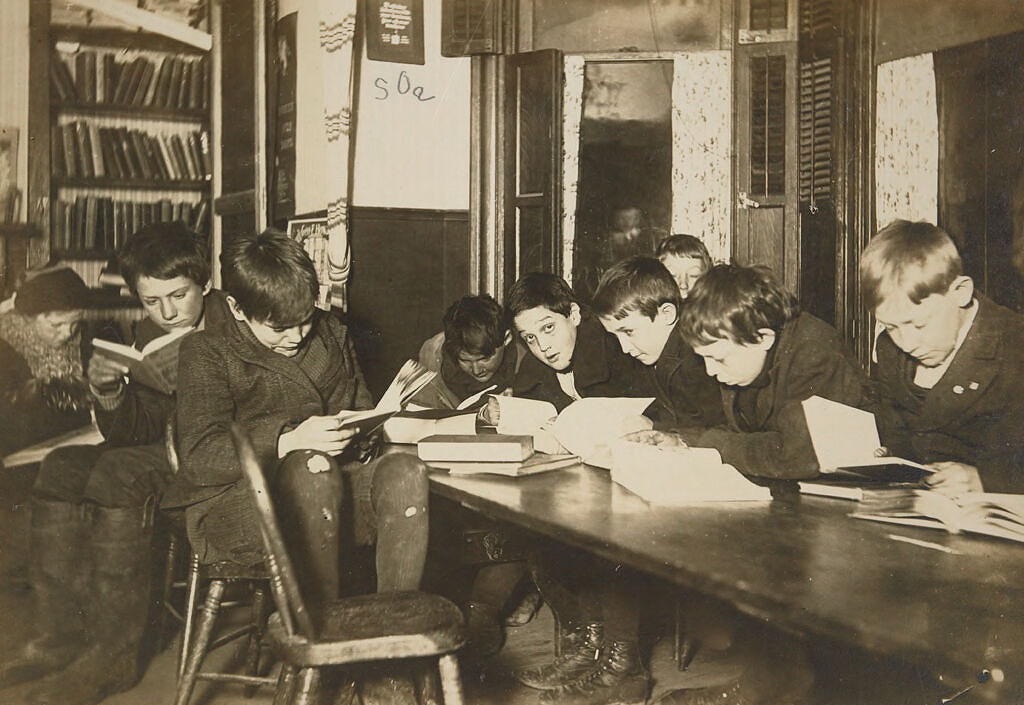
Unidentified Artist: Social Settlements: United States.
District of Columbia. Washington.
"Noel House": Noel House, Washington, D.C.:
Library and Reading Room (. 1903)
"Beware the land speculator promising to eliminate non-existent swamps."
Contrary to popularly promoted misconceptions, our nation’s Capitol was never a shithole. It did begin life as a swamp, one owned by that era’s most enthusiastic land speculator and so-called founder of our country, none other than General Geo. Washington, esquire. Those promising to “Drain The Swamp” were centuries too late, for the original swamp had long before been drained and filled to allow a truly great city to be built. The result was not, like most of this world’s capitols, some ancient artifact built on ruins, but a testament to a country’s citizens’ dedication to self-governance. They funded and built an odd collection of buildings, some grand and inspiring, others quite the opposite. The boulevards were broad and laid out so that every few ran diagonally. The result seemed absolutely unique in this as well as every other country. Its heritage was that of a swamp, for sure, but its legacy was self-esteem.
Many have noted that perhaps the primary function of government has always been to “Make Sausage.”
Weekly Writing Summary For The Week Ending 11/27/2025
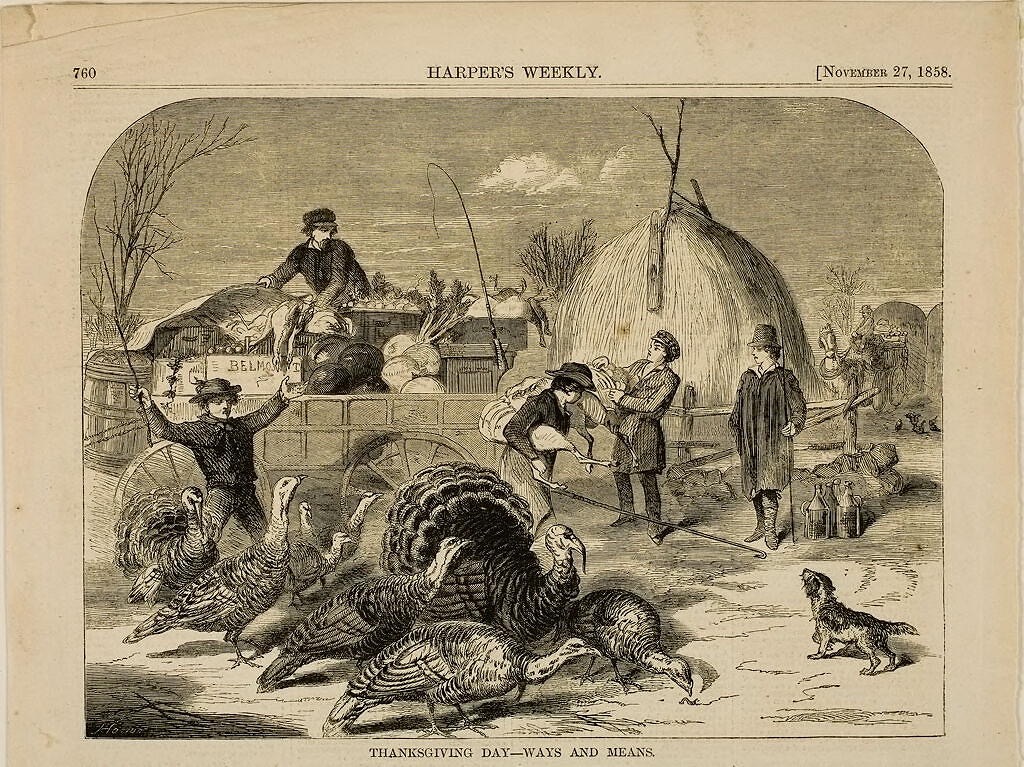
Designed by Winslow Homer: Thanksgiving Day - Ways and Means
Harper's Weekly, November 27, 1858
This writing week, like every previous week, was destined to become a writing week that was. Like you, I live with a trailing tail endlessly emerging, persistently trailing me, and refusing to let go of my present past or my fading presence. I routinely accomplish considerably less than I might otherwise prove capable of producing. Any engine designed with the presumption that it might perform at its design peak was always designed to fail. Any engine built to perform well beneath its design spec was always built to actually exceed its more optimistic expectations. I began this writing week naming a familiar haunt, the Dundency that has always followed me. I praised that most unlikely and always welcomed couple, Dignity and Freedom. I reframed my experience of Decency as a Decendency rather than as an ascendancy up and into any place above. I reported that indecency seems radioactive in Radioactivization (which is a term Google® found no hits for on the internets). I ended this week with a short screed insisting that Decency must be deployed relentlessly if it is to be effectively used. I appreciate all those who shamelessly employ their Decency without ever once necessarily expecting to be rewarded for their efforts. Bless us all as we defend the continuing insults to our Dignity again. Thank you for following along!
Relentless

Félix Edouard Vallotton: Cover for Paris Intense (1894)
"This necessarily requires that the Decent fear less and be Relentless more."
As near as I can determine from here, the universal antidote to indecency must be RelentlessDecency. Nothing more annoys the indecent than Relentlessness being employed in the service of the Decent. I know that we most often associate Relentlessness with more nefarious activities. However, I suppose that Decency probably seems evil enough to the indecent, perhaps among the most heinous possible activities, especially for the Relentlessly indecent. To be Relentless in the service of the good side of any equation demonstrates a reassuring dedication, for even Decency demands some consistency. Nobody much appreciates the merely fair weather Decent. One must, it seems, become requisitely Relentless to be taken very seriously. If I retreat into numbed silence or simply disappear whenever another indecency appears, especially when it seems Relentless itself, I might just as well have never been here. My sporadic contributions to the general well-being might not have gone for naught, but they probably didn’t go half as far as they might have gone had I more diligently held my ground.
Relentless Decency demands some courage from its practitioner, for it won’t always feel safe to honestly display your Decency when immersed in some den of iniquity.
Radioactivization

Barbara Norfleet: High level radioactive waste storage tank: Savannah River Plant (300 square miles): Aiken, SC. 35 million gallons of high level radioactive waste are stored in the deteriorating tanks
Series/Book Title: The Landscape of the Cold War(1988)
Harvard Art Museums/Fogg Museum, Gift of Barbara Norfleet © Barbara Norfleet (2010)
"That's what Decency appears to be here for."
Indecencies seem radioactive to me. They perform like unstable elements, bleeding atoms on their way to becoming something else. They are by their very nature transitory and poisonous. They produce waste that outlives their original purpose. They prove unsuitable for use in anything lasting. We do not build bridges out of radioactive materials for good reasons. We avoid including them in connecting roads, too. They can produce relatively short bursts of extreme energy and, when properly harnessed, longer-lived power. Whatever the use, though, they leave behind messes far exceeding their initially intended usefulness. Their use requires more than usual justification.
I visited my dentist last week and noticed that they no longer draped a reassuringly weighted lead-lined blanket over me when taking pictures of my mouth.
Descending_Into_Decency

Ohara Koson: Descending egrets in snow (1925 - 1936)
Five settling herons between snowflakes; snowy reed at the bottom left.
"That's how Descending Into Decency feels to me."
I instinctively think of Decency as holding an elevated position, slightly higher and left of some center line. When I engage in an act of Decency, though, I feel a sensation more like Descending. I reflectively think of myself as Descending into Decency rather than stepping up into it. This descending should not be mistaken as degrading or any of the other coming-down metaphors. Decency feels like immersive activity, effort that seems to cloak and reassure me, as if I were being carried and cared for, even though I know I’m the one caring for myself in those moments. Decency seems inherently innocent. It expresses an inner innocence regardless of a person’s prior experiences. It can even be an antidote to some experiences, a penance, or a form of forgiveness.
Because Decency’s always a choice, it brings certain limitations.
CommonDecency

John Singer Sargent: Venetian Glass Workers (1880–82)
ABOUT THIS ARTWORK
Trained in Paris, John Singer Sargent traveled to Spain, the Netherlands, and Italy early in his career in order to study how painters such as Diego Velázquez and Frans Hals captured the effects of light and rendered figures in space. Venetian Glass Workers is one of several genre scenes featuring glass-bead workers that Sargent executed in the early 1880s. This backlit view of a shop in Venice is dark and atmospheric except for the brilliant strokes of light green and silvery white paint that describe the canes of glass as tradespeople prepare to cut them into bead-sized pieces, which will then be polished and strung into jewelry.
— —
"…everything's extraordinary, especially and including CommonDecency."
I once inhabited a now utterly mythical place: The Past. What seemed ordinary and commonplace then, when it was present, seems utterly extraordinary and absolutely unattainable now. I do not mean that some rare and special things are now rarer and even more special, but that even the most pedestrianly commonplace items have now joined the ranks of the exceptional. I can almost experience these once-so-ordinary things vicariously now, through dreams and fading memories, though the colors and textures seem blunted after the passage of so much time.
I have been noticing lately just how remarkable almost everything suddenly seems.
Dignity&Freedom
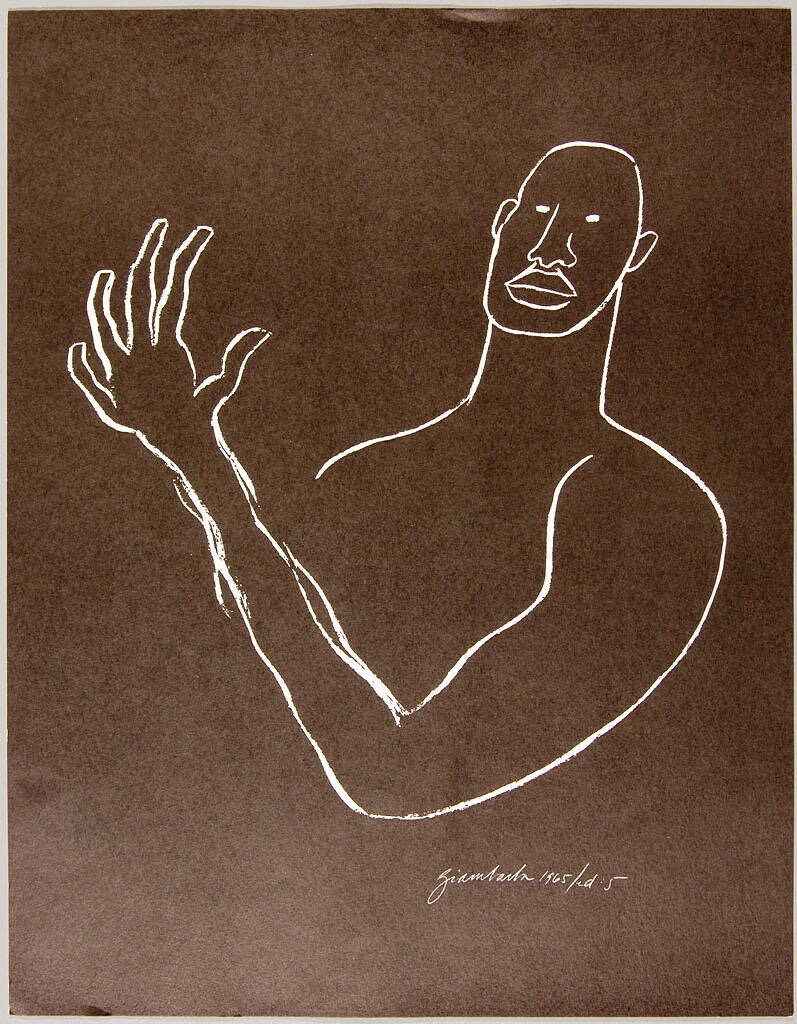
Paul Giambarba: The Withered Arm (c. 1960)
"May Dignity&Freedom never abandon them…"
Facing invasion by a hostile neighbor, Ukraine declared its purpose for defending its sovereignty. It announced that it was fighting for Dignity&Freedom. Their Freedom demanded a deeper purpose. It could not stand alone as sufficient to justify the suffering inflicted in its defense. Dignity would have to be Freedom’s companion to properly justify the struggle. This combination has lent Decency to Ukraine’s otherwise purely defensive strategies, inspiring freedom-loving nations around the world. Unfortunately, my country tisn’t of this at present. Our incumbent has made it his special mission to discourage our intrepid ally by denying it the necessary and prudent support that any freedom-loving nation deserves.
Now the world observes a different struggle, one between Decency and its enemies, who presently most prominently include Russia and the once United States.
Duncency

Mervin Jules: The Art Lover (1937)
Gallery Notes:
An admirer of 19th-century French artist Honoré Daumier’s social caricatures, Mervin Jules satirizes the myopic gaze of a bourgeois connoisseur scrutinizing a painting. The painting-within-a-painting depicts workers demonstrating against the backdrop of a smoke-filled industrial landscape. The subject memorializes the infamous 1937 Little Steel strike, during which police fired on unarmed unionized steelworkers and their sympathizers protesting low wages and poor working conditions. Jules executed this painting during a formative time when he was studying with Thomas Hart Benton at the Art Students League and employed by the silkscreen unit of the Works Progress Administration.
— — —
"Let such mysteries be."
Not all Decencies contain the same quantity of sincerity. Some seem more phony than actual. Some seem counterfactual. I mention this not to encourage paranoia, for minor discrepancies are probably nothing to lose much sleep over. For one reason or another, or for no discernible reason at all, some will pretend to be acting Decently when they actually aren’t. The motive probably doesn’t matter. The insincerity says much more about them than it ever could about you, and what it says about them will probably remain unspoken, even if you were to break ranks and ask after the disconnect. These acts most often remain uncommentable. You might be able to convince yourself that something smells fishy, but the fish rarely admits to any deliberate deception, or even inadvertent. This often means they’re not aware of their inauthenticity. So be that.
I speak here of that niceness that seems out of context.
Weekly Writing Summary For The Week Ending 11/20/2025
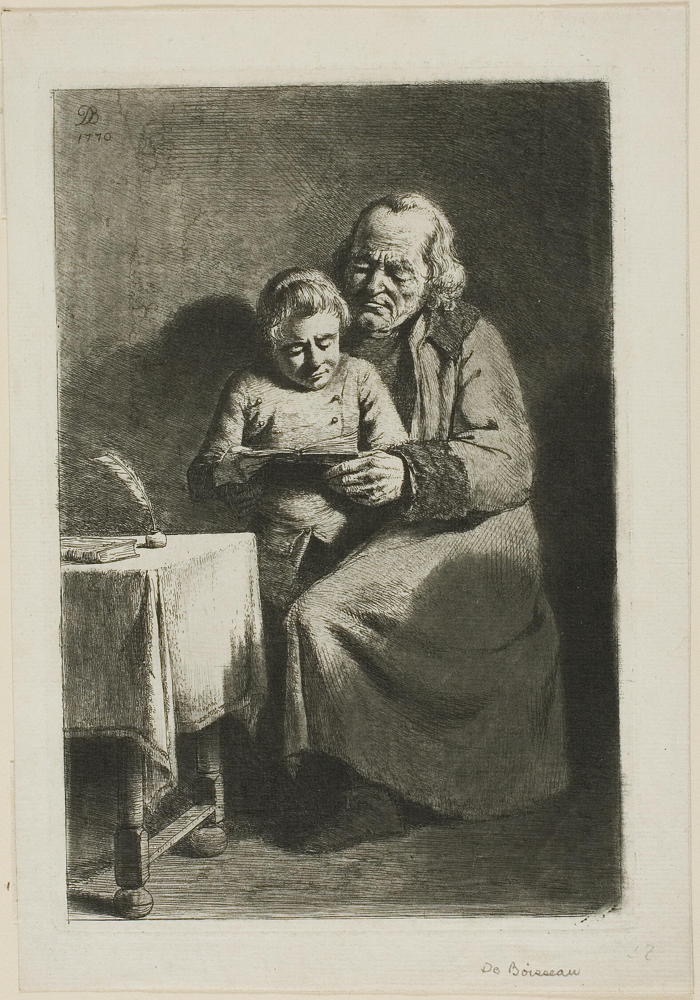
Jean Jacques de Boissieu: Old Man with a Boy Reading (1770)
Our concrete contractor, Pablo, and his crew laid a new sidewalk on the north side of our newly refurbished front porch this week, bringing us one step closer to completing our infinite front porch remodeling project. A new sidewalk serves as the closest thing The Muse and I might ever contribute to permanence here, lasting evidence that someone once lived here, evidence that should last well into the following century. This Writing Week proved to be more speculative than concrete. Change seemed prominent without necessarily feeling imminent. Our hapless administration, still apparently uninterested in administering anything, has been exhibiting some gravely serious difficulties recruiting and retaining EvilPeople in sufficient numbers to completely undermine our Democratic order. I sensed an impending Awakening. The Elites seemed teetering again, on their usual precipice of greatness … or something. I praised our sacred Jurisprudence, which has proven to be the most stalwart defender of our civic Decency. I admitted to feeling Enraged, however politically unacceptable that emotion might seem in a discussion of Decency. I ended this writing week praising the Insubordinate as the true patriot of Decency in our ongoing passion play. Thank you for following along with me here.
Insubordinate

Pierre-Paul Prud’hon: Head of Vengeance (c. 1804)
ABOUT THIS ARTWORK
A study for the figure of Divine Vengeance in Prud’hon’s celebrated paintingJustice and Divine Vengeance Pursuing Crime (1808), the head of Vengeance, who pursues Crime as an agent of Justice, brilliantly reflects the artist’s stated aim for the painting: “to give a commotion to the soul.”
Although the drawing’s blue paper has faded almost completely to gray, the work’s expressive power remains intact.
——
"The Decent direct themselves for their own damned reasons…"
Decency must be an Insubordinate act. It cannot be ordered or productively insisted upon, but must be more or less freely chosen by the individual engaging in it. One may take instruction in its practice, though this offers little beyond a grasp of its underlying concept. Practice proves different in actual practice and utterly depends on context, which shifts so that any two instances might prove the opposite of being indistinguishable from each other. Even experienced practitioners often wonder if what they just tried really represented the Decency they intended. Not even the receiver can always confirm receipt. So much of its delivery depends upon intention, which often necessarily remains implicit. Decency frequently appears in unexpected guises.
Indecencies can easily be coerced.
EnRaged
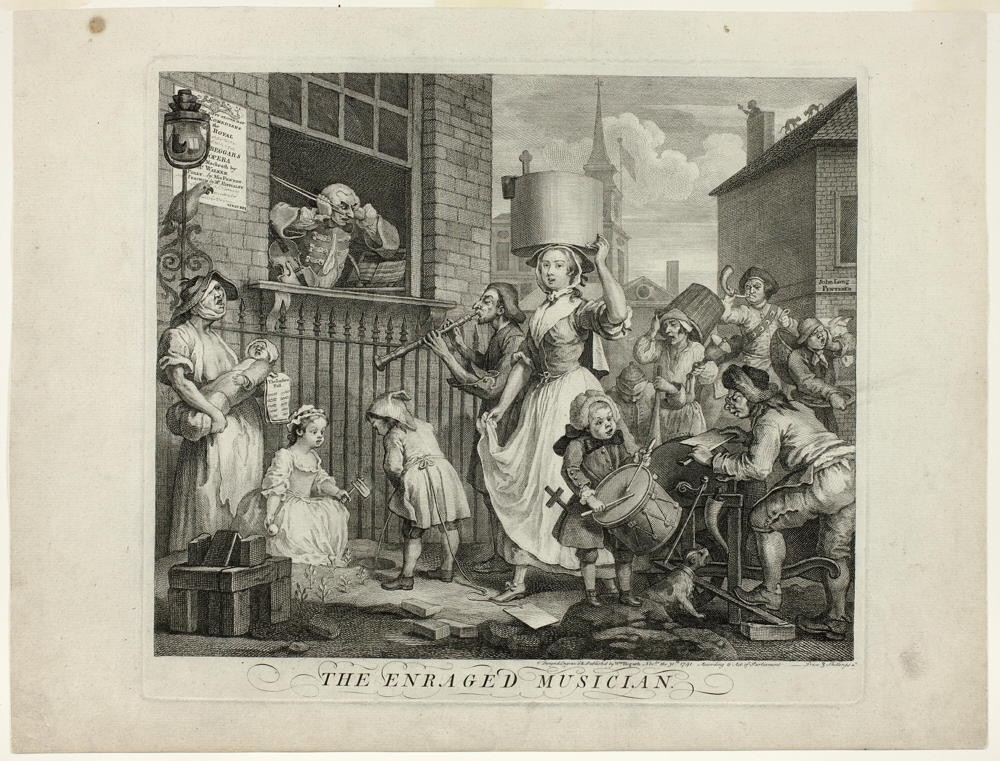
William Hogarth: The Enraged Musician (November 1741)
"Don't tread on Decency!"
Contrary to popular misconception, the Decent do not naturally lean heavily toward passivity. In some significant ways, Decency can encourage a fury, if only because it tends to sharpen sensibilities. Those incapable of properly parsing experiences, who live a more numbed existence, might find it more challenging to act out when encountering the subtly outrageous. Many infractions fail to piece together their native insensitivity. This can lead to a disturbing passivity. Those, however, more primed to sense disturbing differences might be much more easily encouraged to respond with rage, and even to complain that certain events leave them feeling EnRaged. This fury doesn’t always show, for Decency sometimes, even often, paradoxically, encourages a stifling of certain rages, lest a reaction appear equally outrageous. The resulting ‘anger turned inward’ can spawn periods of dark depression as inner frustration fails to find adequate release in outward expression.
The Decent sometimes foments dissent.
Jurisprudence
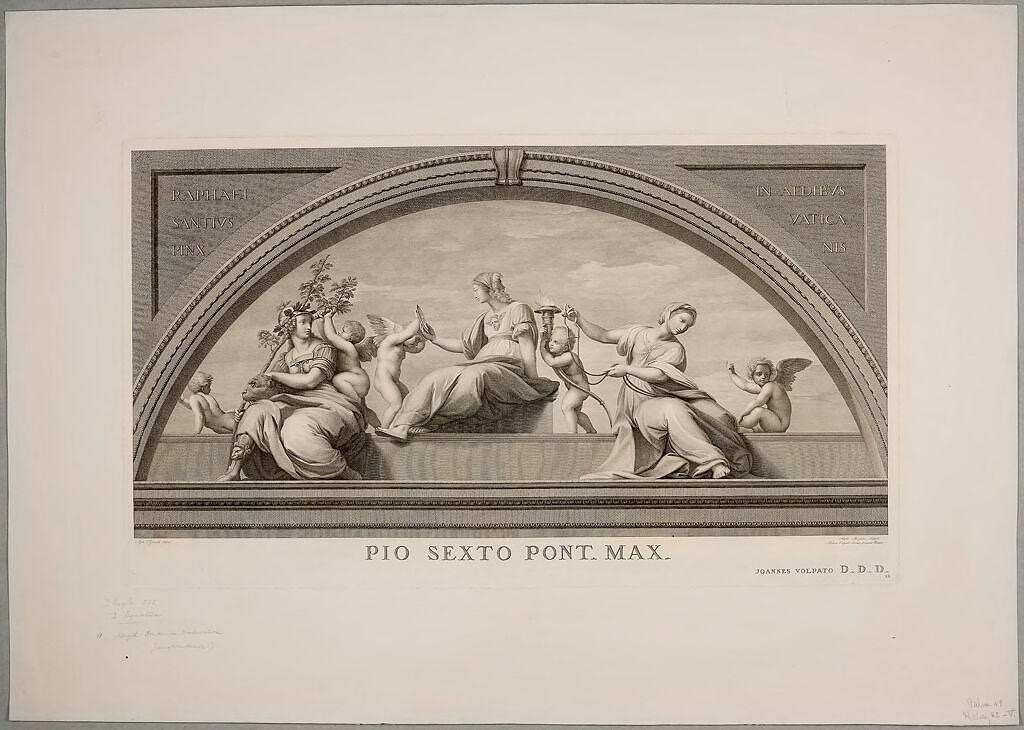
Raphael Morghen: Jurisprudence (18th-19th century)
"Even those who assault our Jurisprudence deserve justice. Decency demands it."
We hold our judicial system sacred, or we have. It has seemed imperiled lately, if only due to the sudden incursion of indecency into her hallowed halls. Our Jurisprudence was the store of our society’s civic Decency, though it has lately seen repeated attempts to degrade it. These have been mainly unsuccessful, if only due to the native ineptness as lawyers of the agents of indecency attempting to intrude. They have filed motions that don’t pass muster and suits that almost always prove frivolous. Our budding Department of Injustice turns out to actually be a department of dunces and indecencies in practice. They seem to believe that they can make anything so by merely declaring it so. However, our Jurisprudence, by which I mean our legal philosophy and long traditions, usually renders that functionally impossible, thank heavens.
Between judges chosen for their partiality and a SCOTUS half dedicated to indecency, our civic Decency has sometimes been taking it in the shorts.
Elites
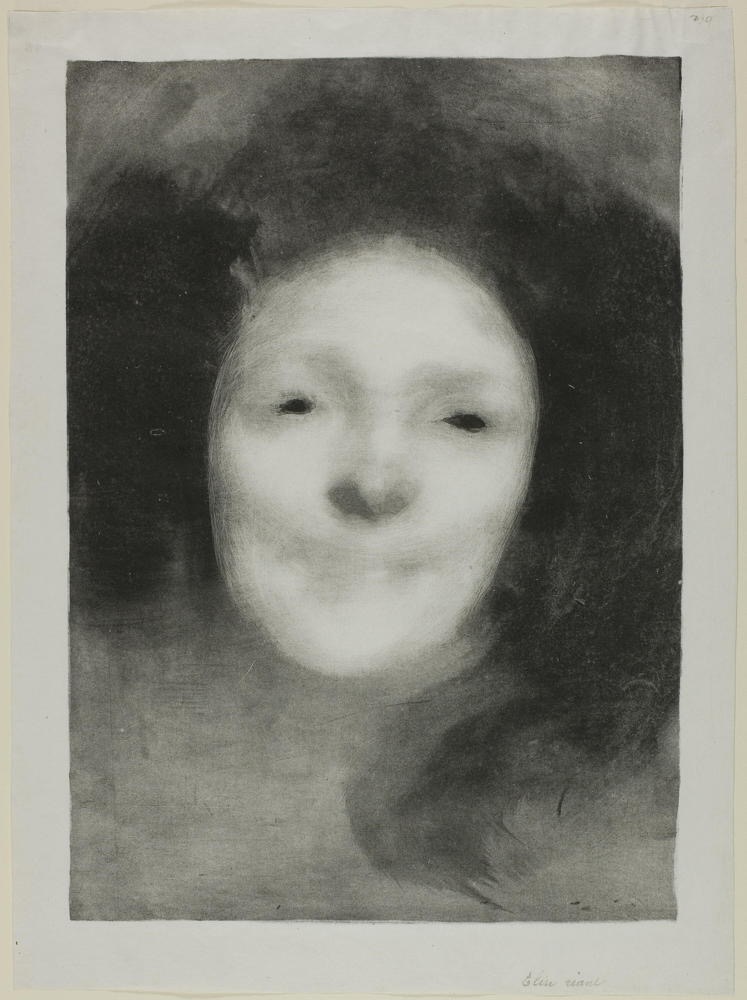
Eugène Carrière: Elise Smiling (1895)
"…they always seem to disappoint us and themselves in practice."
Some hold a belief in the absolute necessity of maintaining an Elite class in a society. History provides strong evidence against this belief. The story insists that Elites set the standards others follow and sustain society’s highest ground, enabling “regular” people to attend to lesser interests. This notion contradicts the first principle upon which this country was founded: the notion that all people are created equal. The historical record reveals many examples of Elites who, rather than serving their publics, merely served themselves. Crowned heads more often abused their power than wisely deployed it. Of all the awful notions humans have spawned, the notion of the necessity of superiority might have proven to be the worst. Yet, we still worship leaders and imagine them somehow superhumanly capable when, much more often, they’ve proven to possess feet of the most fragile clay.
Our country was founded partly to address the paradoxes that Plutocracy inevitably produces.
Awakening

Henry Duff Linton and Edmond Morin: Awakening (19th century)
"…American Dreams emerge from Awakenings."
The question of when our incumbent might start to seriously bleed supporters has been prominent in the minds of his many detractors. For us, and I consider myself a prominent detractor, it was always unthinkable that anyone might even imagine supporting him, for he seemed simply vile. His incoherence alone rendered him unsupportable since nobody has ever successfully parsed even his simplest utterances. Still, he seemed to possess some hypnotizing power, an astonishingly strange attractor, that reliably attracted and retained what he labeled his base. His base seemed at least aptly labeled, for they seemed to follow their leader beyond the depths of conventional political depravity. This devotion was truly disgusting to me. He’d famously insisted that he could stand in the middle of Fifth Avenue in New York City and shoot somebody and nobody would raise an eyebrow.
That “Teflon Don” capability seems to have started weakening lately.
EvilPeople
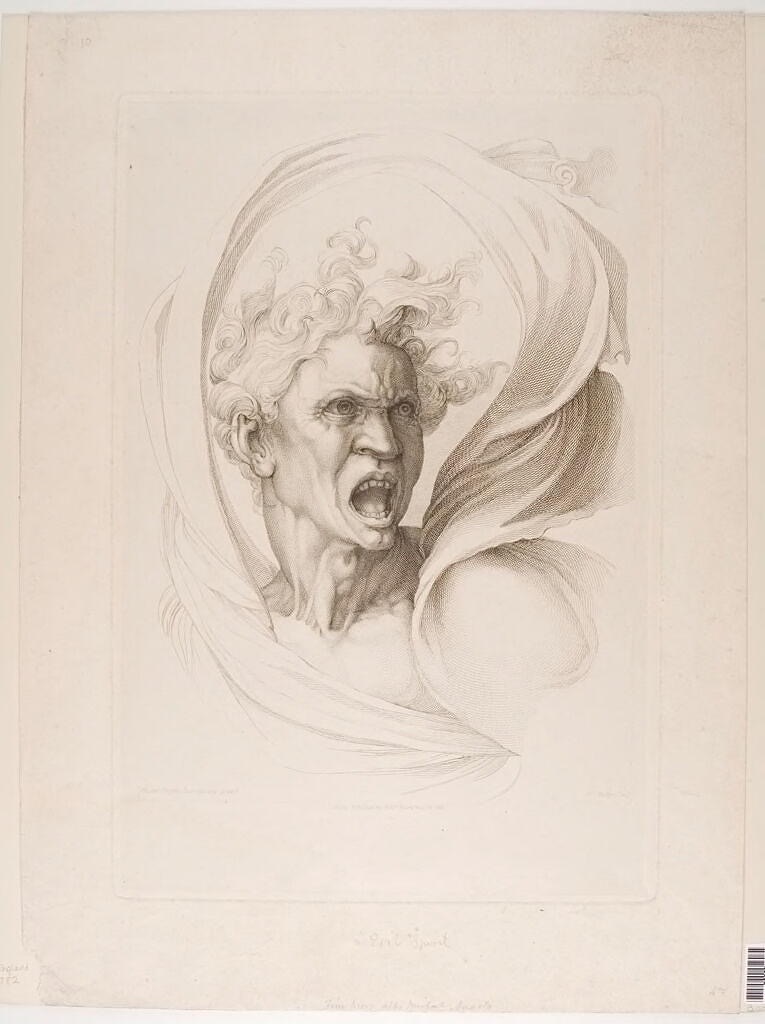
William Sharp: Evil (18th century)
"…never in sufficient numbers to succeed, thank heavens."
A promising dispatch from the front lines of The War On Decency reports an apparent sharp decline in the ready availability of additional EvilPeople to populate the ranks of the administration uninterested in administering anything’s many anti-Decency programs. Reports indicate that hiring and performance bonuses have proven inadequate to attract sufficient numbers of eager candidates. Further, a reassuring swell in voluntary resignations has only added to MAGA’s staffing problems. It seems that officials grossly overestimated the number of Americans who would voluntarily stand against their fellow citizens. This shortage was reportedly the deciding factor behind our incumbent ordering National Guard troops to be mobilized into our cities. Adequate numbers of volunteers refused the assignment. Now, though, with courts refusing to permit our incumbent from deploying the National Guard against citizens, the whole movement seems increasingly imperiled.
Their naive belief that we would not prove to be Decent people under pressure has apparently bitten them in their collective ass.
Weekly Writing Summary For The Week Ending 11/13/2025
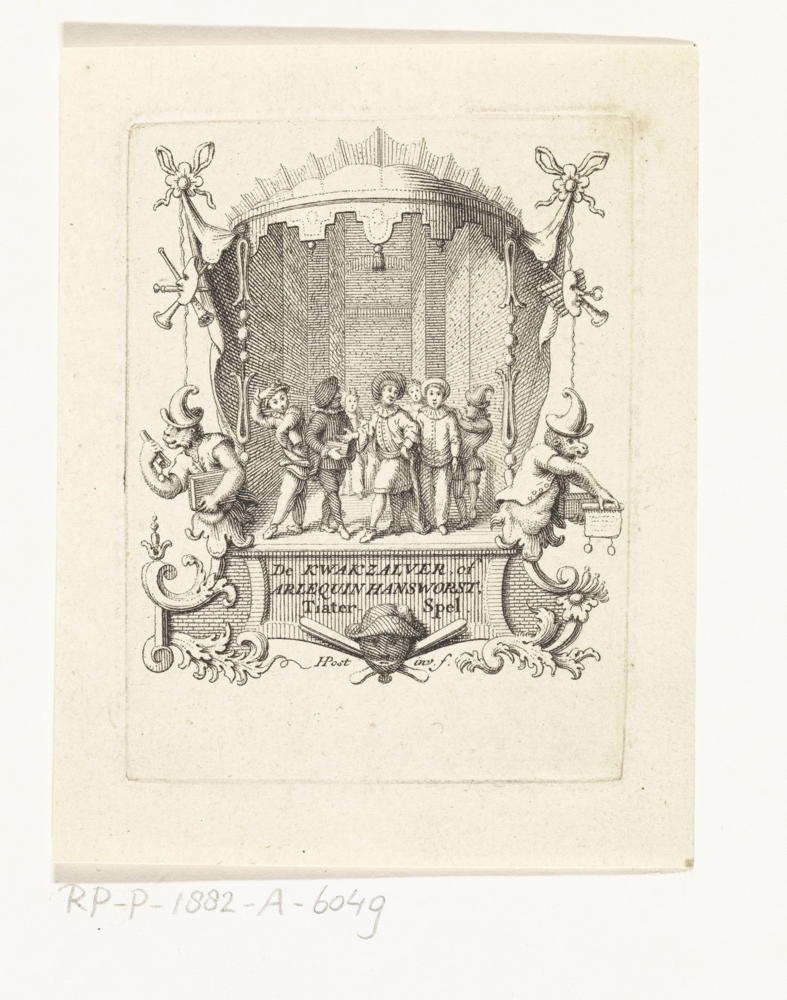
Hendrik Post: Title vignette of "the quack" (1718 - 1751)
Vignette with a group of actors inside an ornamental frame with musical instruments and masks and two monkeys with zots hoods, holding books and documents with stamps. The title of the farce is on a wall under the stage.
This writing week proved to be a genuine discovery. As usual, I set off on this adventure not understanding the purpose of the excursion. I consider this factor to be de rigeuor. If I planned beforehand or (shudder) outlined the trip before I took it, I sense that I might have leached most of the eventual potential out of it. I entered naked and, right off the bat, I hit at least a double into the corner with ThanksTaking. In this venial season of political degradation, it made perfect sense (and I make no overstatement suggesting this) to downgrade the usual, familiar Thanksgiving celebration to the level of the typical druid appreciation: roasted gruel with a side of sour cide, instead of the usual turkey with trimmings. I then entered into a short series of side-explorations, considering the relationships between Decency and Disgrace, Disgust, and Misdirection. I then slipped into a half-remarkable question: What might be the MotiveToDecency, given that it offers no clear evolutionary superiority? I ended this writing week admitting that I've been increasingly resembling one of my old nemeses, whom I had always considered somehow beneath me: the venerable and disturingly similar to me, the ever-Decent Mr. Magoo! Thank you for following along on these voyages of discovery!
MrMagoo

Eyeglasses, in case, Archival Material (20th century)
Collection of Barnett and Annalee Newman
"Wisdom comes from noticing the ridiculed other is us.
Acknowledging this preserves Decency."
MaGoo was a Decent man by most accounts. He was never accused of intending cruelty. Quite the opposite, he was, by all accounts, an innocent, guilty of perhaps, at worst, naivety, at best, a tenacious ignorance. He never knew what he didn’t suspect, and he apparently never suspected anything nefarious about anybody, including himself. His sole sin, if, indeed, this could be counted as a sin, was his steadfast refusal to wear glasses. Being extremely near-sighted, this insistence produced hilarious results as he continually misidentified virtually everything he encountered. He could have easily qualified as The Man Who Mistook His Wife For A Hat, had he been married. He was not ‘touched in the head,’ as was often said in his day, but tenaciously ignorant of the world he inhabited. Because he never knew better, he never suffered. He continually encountered life-threatening situations without once suffering any adverse consequences. It was as if he carried a guardian angel on his shoulders, or one carried him on hers.
In my youth, I watched MaGoo’s antics as portrayed on a cartoon series.
MotiveToDecency

William Merritt Chase: Alice (1892)
"It's me, mustering my own Decency for its own sake. That's plenty."
It doesn’t seem fair that Decency doesn’t bestow special privileges on those who practice it. The Decent get sick and die at pretty much the same rate as the indecent do, so Decency might not provide any evolutionary advantage. Likewise, we see Decent people being taken advantage of, despite their good records. Decency also seems like a difficulty when compared to its alternatives. Just appearing upstanding can prove exhausting, and maintaining a Decent reputation can sometimes seem life-threatening. Those who cut corners without remorse might seem to inhabit the most advantageous universe. Someone else absorbs their overhead costs while Decency spends extra resources dotting their ‘t’s and crossing their ‘i’s. Why?
The MotiveToDecency mystifies me.
MisDirection

Jean Daullé: The Magic Lantern (1757)
"Why, then, does Decency so often prevail?"
Contrary to popular misconception, Decency is not necessarily in a competition with indecency. They might both exist on some imaginary continuum, but that line bisects dimensions as well as linear space. It’s more diagonal than level, and not necessarily a straight or narrow line connecting the two poles, which cannot be adequately characterized as opposites without ignoring some rather obvious similarities. One continuing challenge stems from the straightforward-seeming notion of good and bad, beneficial and evil. Decency isn’t necessarily without sin, and indecency doesn’t always qualify as even a venial sin. Decency might satisfy convention while offending with pretension. Indecency might occasionally be absolutely necessary. Let he without indecency cast the first stone.
Indecency might seem to lack the discipline necessary to fully abide by the rules.
Disgust

Pieter van den Berge: Disgust (1675 to 1737)
A man, and face, sitting on the ground, his legs and arms rejecting to the left.
"We bring the conversation around to less upsetting topics before the dessert course gets served to aid digestion."
I feel odd mentioning this, but I’ve been noticing Disgust being expressed whenever Decent people gather these days. I’d never before closely associated Disgust and Decency, but upon deeper reflection, I suppose it makes sense that they might commonly appear together. You see, the Decent possess a palate capable of sensing the sorts of dysfunction capable of producing Disgust. Some seem to be able to engage in most any lowlife activity without turning their stomach, while others find revolting displays entertaining. Those who find cage fighting diverting, for example, probably aren’t the same ones who attend symphony concerts. I understand that the standards by which audiences judge performances have changed over the generations; nobody gives a second’s thought these days to watching a bloody murder mystery over dinner.
Some core discerning Decencies remain.
Disgrace

Anonymous Italian, Venetian: Book IX.5.
Roman consuls are sent under the yoke of Samnites
and are exposed to disgrace {Primae Decadis Liber Nonus p. LXXV}
Series/Book Title: Illustrations from Livy, Decades. Venice, Philipp Pincio, September 27, 1511
(1493)
"Wherever Decency seems endangered, some Disgrace is being denied."
Indecency seems to be somehow related to Disgrace, though I’m uncertain which serves as the chicken and which as the egg. Does indecency follow Disgrace, or does Disgrace trail indecency? I sense that Decency does not know Disgrace intimately, if at all, and that Disgrace often accompanies a fall, again, as either cause or effect, perhaps either. What does it matter? I’m toying with a proposal that indecency often accompanies Disgrace and seems to be frequently employed to attempt to cloak its presence. A fear of Disgrace might frequently justify indecent behavior, such that where indecency thrives, Disgrace appears to be hiding nearby. In this sense, indecency serves as a tell that some potentially embarrassing truth might be lurking. What might seem like run-of-the-mill cruelty, for instance, might distract from some deeper depravity.
Certainly, where indecency seems to thrive, depravity seems to follow right behind, or perhaps it leads.
ThanksTaking

Jacques Callot: Avarice -
Series/Book Title: Seven Deadly Sins (17th century)
"Our fathers grant to thee, expanding liberty, of this we sing. Land where our father's tried to live genuinely Decent lives, protect us by thy light, let freedom ring!"
Continuing their War on Decency, the administration, utterly uninterested in administering anything, continued eroding our foundational liberties by severely wounding one of our most treasured traditions: Thanksgiving, and defiling it by denying food assistance to the most vulnerable thirteen percent of our citizens, thereby eroding the sense of plenty usually accompanying the harvest season, replacing it with a deepening sense of dread. Further, the Federal machinery began dismantling our air traffic control system by withholding air traffic controller paychecks, prompting them to call in sick in record numbers, resulting in a spate of near misses, clear signs of an overloaded system. The administration began shutting down pieces of that system, cancelling service, thereby threatening the usual migrations homeward common to this season. Thanksgiving has this year been subsumed by a deepening sense of ThanksTaking.
Who thought it possible that anyone or anything could deeply wound our native optimism?
Weekly Writing Summary For The Week Ending 11/06/2025

J. H. W. Tischbein: Three Beavers Building a Dam (c. 1800)
ABOUT THIS ARTWORK
Johann Heinrich Wilhelm Tischbein experimented with animal physiognomy in many drawings. Inspired by the Swiss philosopher Johann Kaspar Lavater, the artist believed a person’s character depended on the animal he resembled. As Tischbein wrote in 1796, “I have undertaken another [series of drawings] in order to learn more about man. To make this study easier it is necessary to begin with beasts, since they are easier and their characters more evident.” Traditionally busy animals, these furry beavers exhibit human expressions as they focus diligently on the difficult task of stemming an exuberant waterfall.
This writing week brought an end to Daylight Saving Time, ushering in my overlong season of early darkness and gratefully earlier sunrises. I was going to be up anyway, so I appreciate early daylight almost as much as I revile early dusk. This writing week also marked the end of the overlong baseball season, a national pastime that consumed more than its fair share of my time toward the end of the Series. Halloween visited, christening our refurbished porch with treat-seekers and kid footprints. I celebrated with Treating. I explored the metaphor of Decency as Dust. I found it surprisingly satisfying before delving into barking Madness, not as metaphor but as practice, as presently practiced by our increasingly hapless incumbent. I explored the proliferation of what I labeled ‘UmUrgencies,’ ineptness-caused emergencies invariably responded to ineptly, too. I found some solace in writing about Derision’s generally impotent attempts to discourage Decency. Then I ended this writing week by reminding myself and my readers that Decency almost exclusively comes in remarkably small packages. Thank you for following along here!
SmallDecencies
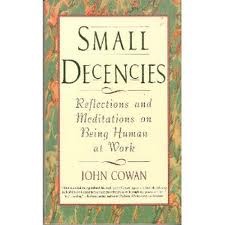
M.E. Edwards: Full of worries (1892 - 1905)
Gallery Text: Sheet with 6 representations of different kinds, including representations of a man who finds a sick boy on the street, a traveler who eats his bread and a man who makes wooden dolls. Between the images, verses in book print.
"Decency seems to reliably visit only those not desperately searching for it."
It might be way past time that I clear up one possible misunderstanding: Decencies almost exclusively come in very small packaging. I’m not denigrating grand gestures, for those most certainly have their place. Nor do I badmouth the occasional excesses which add that certain celebratory spirit to life. The grandiose and even the gross definitely have their places, but neither proves necessary nor sufficient to induce the genuinely Decent. Decency almost exclusively appears in tiny sizes, and even when it seems to appear in one of the larger ones, it tends to be some attribute of the thing that carries the Decency within it. The balance usually turns out to be packaging.
The often disappointing attempt to produce grand changes tends to be entirely overshadowed by the tiny, thoughtful gift —the kindergarten artwork, rather than the Hope diamond.
Derision
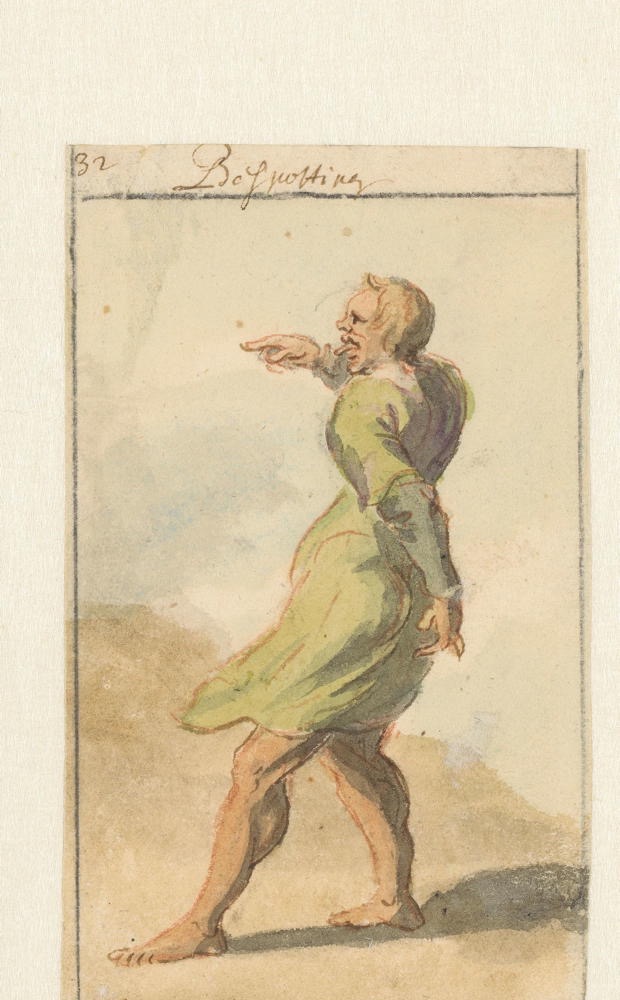
Pieter van den Berge: Spotting (1675 to 1737)
A standing man with his tongue stuck out and his right hand pointed raised.
"…indecency exhausts itself with its own irrelevance."
Few compliments seem less complementary than Derision, but it tends to be the praise of choice when passed from the indecent toward the Decent. The indecent hold limited resources, certainly less vast than Decency ever commands, so they compensate by making loud noises and dramatic gestures that signify little and mean even less. In any odd moment, their advantage, if only represented in volume, might appear to be overwhelming. They do the lizard dance where they stand tall on their skinny hind legs to appear much larger and more powerful than they actually are, relying upon startle reflex to balance what they not mistakenly understand to be uneven scales. Decency learns not to take those threats too terribly seriously, however otherwise terrible they might seem.
Decency learns this lesson in the oldest of the old-fashioned ways.
UmUrgency

Edward S. Curtis:
Hamatsa Emerging from the Woods - Koskimo
(c. 1914)
“Nobody ever better deserved one of those handbaskets they say we should order.”
Never a day slips by or an afternoon recedes without another crocodile emergency appearing. The indecent house of cards our incumbent and his regrettable cabinet have constructed continually threatens to crumble. They have 911, or its equivalent, on speed dial. It’s always the same pattern: someone tried, or usually actually managed to hoodwink them into believing, but it turns out they were misled. Another hasty response was absolutely necessary lest some situation threaten to get resolved. Each intervention only serves to deepen each dilemma until the administration, which never had any intention of administering anything, feels forced to administer something. Their disinterest seems most manifest then, for their proffered solution always makes the situation worse, often much worse. Then they declare another unqualified success, by which I mean another action in no way qualified to be classified as successful. Then, action properly defended to their own satisfaction if no others, they return to parade rest until another inevitable UmUrgency interrupts their distraction again.
The rhythm of these disruptions has become perfectly predictable.
Madness

James Naumburg Rosenberg:
Mad House (20th century)
"May Decency preserve us until this Madness crumbles."
Occasionally, in the course of human affairs, sanity becomes an impossibility, so Madness takes over for a spell. These periods tend to be brief in the scale of any country’s history, but memorable in terms of lessons learned, or, if not necessarily learned, then lessons experienced. These lessons become uniquely memorable, in part, because they produce devastating results: stock market crashes, wars, famines, and the occasional pestilence and plague. It’s almost as if success became unbearable, so voters opted to try failure for a while. Their world shortly thereafter goes to Hell. That they brought it on themselves complicates responding in any otherwise reasonable fashion, so squabbling consumes what might have been a crisp reply. Countries do tend to eventually achieve recovery, albeit a chastened one. Then comes the painful period where they try to learn something from their experience. Much blame changes hands, and eventually, what will pass for a fresh sanity takes over.
During the period of degradation, Decency becomes a stranger.
Dust

Willem van Konijnenburg:
The re-voting in Groningen (1897-06-27)
"Ditto and more so with Decency."
Think of Decency as Dust, as a sometime annoyance and occasional inconvenience. In this country, Dust is ubiquitous, present regardless of cleanliness habits. It’s probably never not there, but its presence isn’t usually prominent. It’s most appreciated in its absence, for the necessities accompanying its presence tend to inconvenience. It shocks when it finally comes into focus, almost always unexpected. Annually, the knick-knacks get attended to, and a deep sense of significance and gratitude always gets left behind. The Dust was never as rare as was the shocking awareness that it had always been there.
Decency seems the opposite of Dust, that reviled presence that tends to sneak up on us. Decency seems clean by comparison, but think of indecency as mud.
Treating
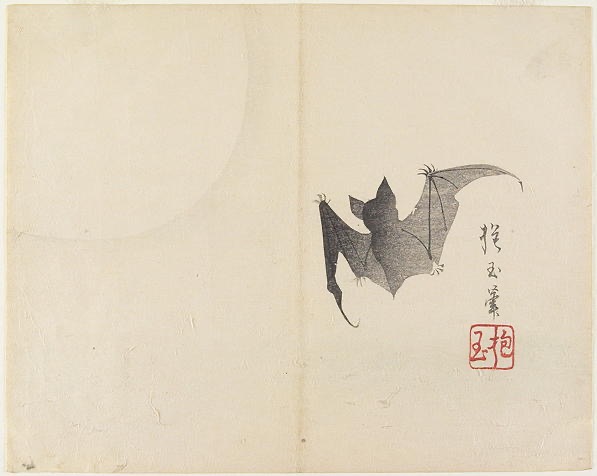
Yamada Hōgyoku: Bat and Moon (1830s)
"Let tradition bring us through those times when we feel most threatened."
I take refuge in traditional rituals when Decency wears thin. I had forgotten how important Halloween has always been until that first goblin rang the doorbell to threaten me with tricks if I didn’t deliver a treat. The current crop of kids passed muster, mysteriously dressed as current characters. I have to ask what each one ‘is,’ because I don’t get those memos anymore. I wore a vintage Felix the Cat costume in my time, though I doubt any of this year’s crop of costume wearers ever knew to remember who Felix was. One came bare-chested in the chill. One wore an inflatable T-Rex suit that probably snagged on the rose bushes that line our front walk. Many forgot to declare, “Trick or Treat,” and needed to be reminded to fulfill their part of the performance. I felt like I inhabited a Norman Rockwell painting or a vintage Walt Disney movie, experiences I had been in sore need of believing in again.
Kids these days don’t much go in for tricking, certainly not on the scale kids did in my grandfather’s youth.


